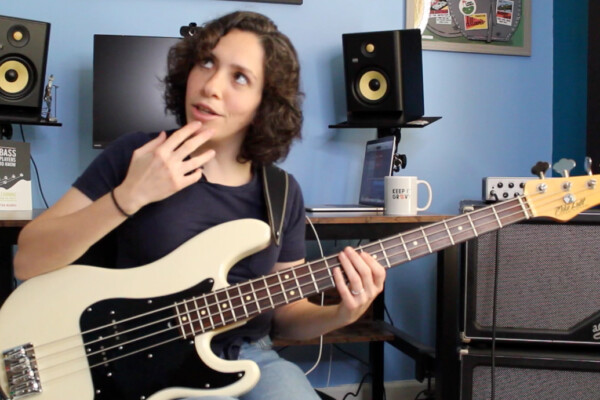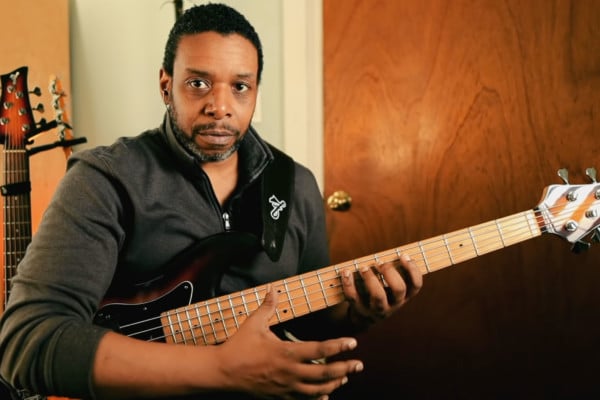Challenges to Good Intonation in a Live Situation

Good intonation is a lifelong concern for every double bassist. We train our ears, we work constantly to match pitch, and we devote large sections of our individual practice sessions to improving it. Among other things, the sheer size of the instrument demands our constant attention to pitch.
Sometimes though, even players who normally have impeccable intonation can have issues when playing live. It usually boils down to not being able to hear everyone, including ourselves, clearly. Some common concerns we must deal with are:
The bass is not an inherently loud instrument.
When playing acoustically, the instrument is often not capable of playing as loudly the other instruments in the ensemble. We can never compete with the volume a trumpet, piano or drums for example. At even moderate volumes, it can be difficult for us to hear fine distinctions of pitch. Even a single piano can completely overwhelm the volume of a bass. Such a mismatch makes good intonation difficult.
The bass’s sound projects away from us.
Even when the general acoustic volumes of the instruments are well matched, our F-holes are several feet below our ears and pointing away from us. It is not uncommon that we may hear our colleagues more clearly than we hear ourselves. This is common, for instance, in an orchestral situation. We may hear our stand partner, and the violins from across the stage, more clearly than we hear ourselves. This presents a unique intonational challenge.
Good stage volume is sometimes not conducive to hearing pitch clearly.
When we are amplified, a volume that allows us to hear fine distinctions in pitch may be at odds with a good overall stage volume. At times, to play well in tune, we need our amp louder than then would be good overall balance on stage, or in the audience. Clearly, the audience wins.
So what can we do to improve our chances, and our intonation, live? I’ve found the following strategies helpful:
- Amplify whenever it is not inappropriate. Even when the other instruments are acoustic, a small boost on the bass can even out the playing field sonically. If it’s not fitting to face the speaker out to the audience, face it towards you, or have a small speaker at head level.
- If you are using monitors, make sure you can hear yourself and your colleagues clearly. When possible I suggest being able to hear your on-stage amp and the monitor.
- Become attuned to the resonance of your instrument. Obviously some situations (like an orchestra) will not allow for any amplifiers near our head. In such situations we have to rely on being able to feel the resonance of our instrument. As bassists, we need to be finely attuned to what the instrument feels like when we are in tune. When the bass is played in tune, it will have a resonance that can be heard and also felt, by the player. Being able to recognize this feeling is an essential skill for some performance situations.
- Lean your head towards the neck of your bass. You wouldn’t want to do it all the time, but, upon occasion, you can place your ear on the neck of the bass to hear yourself more clearly.
- Have a visual reference. Some players also use “dots,” or markers. To be clear, they can’t make up for a bad ear, and we shouldn’t rely entirely on the visual aspect of things. However, markers can help the end product, especially when hearing ourselves, our colleagues, or both, is difficult. They can also be a lifeline when the sonic situation onstage is completely untenable.
Hearing clearly in live performance is a challenge every performer needs to navigate. Sometimes, it is just not possible. Whatever the specifics of a particular performance situation, we still need to be in tune, even if our circumstances are less than ideal. The audience won’t know we can’t hear ourselves, or our colleagues, as well as they can. They only hear the result.
What are your strategies for ensuring good intonation on stage? Please share in the comments.
Dr. Donovan Stokes is on the faculty of Shenandoah University-Conservatory. Visit him online at www.donovanstokes.com and check out the Bass Coalition at www.basscoalition.com.




Putting my ear against the neck, as you mentioned, helps me a lot, particularly while playing in the symphony. Sitting down, in this situation, has helped my intonation, because the neck is closer to my head than when I’m standing up.
In setting where I can’t hear myself well, I’ve been experimenting with sending my pickup’s output to a small headphone amp and using one small earbud in my left ear. It’s just loud enough for me to clearly hear the pitch of my bass. So far, so good.
Had a crazy intonation situation a few years ago. I was doing a show tune performance in a mid sized concert hall. For staging reasons, they had me in line with the back of the piano, opposite the keys.For all three rehearsals, I couldn’t get anything in tune; no matter how I tuned or messed around with my upright intonation, everything always seemed 1/4 step out. I wasn’t sure if it was me, the piano, the singers, or the room, but I assumed it was me. On opening night, I was discouraged and angry with myself. But as soon as we took the stage, the intonation issues disappeared. Apparently, the full audience absorbed whatever weird reflections were in the room caused the pitch distortion. The performances went off perfectly. Big lesson learned there.
I’ve had this happen, too. It’s a very strange acoustic phenomenon that was explained to me once, but I didn’t understand. I had to use a small amp tilted o my head in order to overcome for rehearsal purposes, but was fine in performance.
Pizzacato can be very forgiving in any medium. Arco is the true determinant of correct intonation. However, weather can play a massive part in the overall tuning of the bass. I did an outdoor gig on a hot humid day and couldn’t keep the bass in tune no matter how much I compensated. Other times, my intonation was spot on but my tone was as ugly as sin. Sometimes I wonder why I play this instrument. Bit of a love-hate thing going on.
A good article but I’m not a great fan of dots or markers. Muscle memory is much more important.